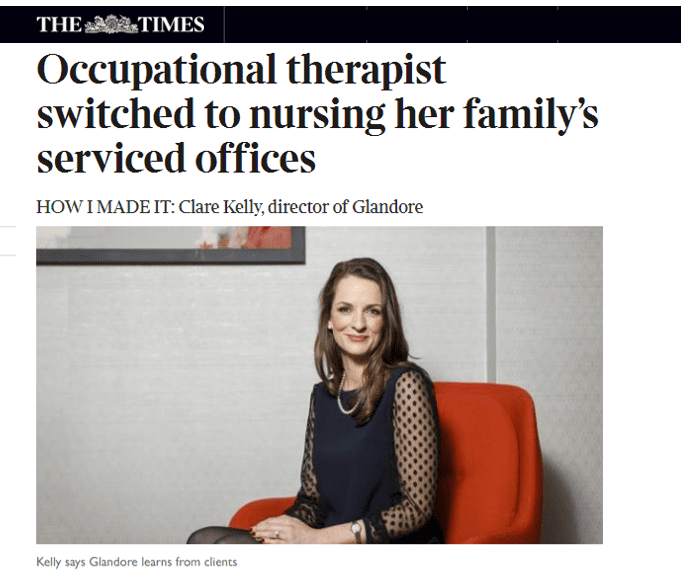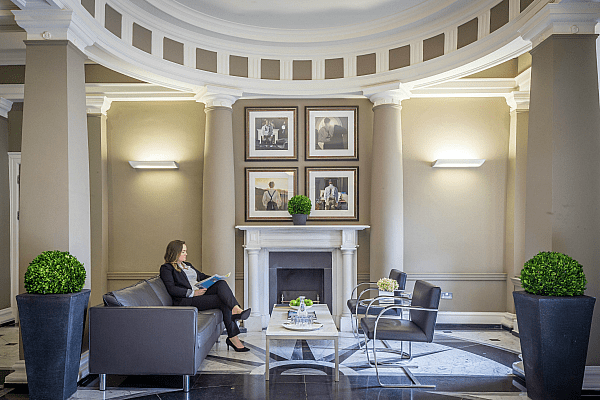The Sunday Times: How I Made it – Clare Kelly, director of Glandore

Occupational therapist switched to nursing her family’s serviced offices
HOW I MADE IT: Clare Kelly, director of Glandore
This article first appeared in the 19.03.2017 version of The Sunday Times UK & Ireland.
Clare Kelly’s route to a career in property has been a circuitous one. Now 35, she grew up in the family home in Carrickmines and studied occupational therapy at Trinity College Dublin — a choice influenced by her late mother, a nurse who died when Kelly was 20.
Kelly worked at, among other places, the National Rehabilitation Hospital in Dun Laoghaire. After a stint in Australia, she returned to Ireland in 2007. The homecoming proved a turning point. “I loved occupational therapy and it’s a really rewarding career but, when I was travelling in Australia with my now husband, one of the jobs I got was in business, and it sparked my interest.”
Her father, Michael, spent a number of years as a senior executive in the pharmaceutical sector, specialising in marketing and distribution. In his downtime, he bought and renovated buildings. Eventually, he ditched the day job to focus on his hobby, and set up serviced office provider Glandore.
In 2001 he opened 33 Fitzwilliam Square, in the heart of Dublin’s Georgian business district. At the time the economy was just beginning to bounce back after the dotcom bust. “There were loads of commercial offices available for businesses starting up then, but there was no flexibility,” said Kelly. “Twenty-five-year leases with very limited break clauses were the norm. My father spotted an opportunity.”
The office offered 15 units, looked after by one receptionist. It filled up with tenants almost immediately.
A second development, Fitzwilliam Hall, represented a big step up in scale. “It opened in 2005 and by that stage we were getting inquiries from much larger companies looking for both scalability and flexibility, and that’s what it offered — a line of sight so that tenants knew they could grow from a staff of 10 to 20 or 30, and up, easily.”
Fitzwilliam Hall can accommodate up to 350 people, with one resident employing a team of 90 staff there. Buoyed by its success, in 2006 Glandore opened a 300-workstation building in Arthur Street, Belfast, centrally located near Donegall Square. This was followed, in 2011, by a second building nearby.
Grand Canal House, in Dublin’s so-called Silicon Docks, and 16 Fitzwilliam Place, its newest development, complete the portfolio. The business has six locations, and 60 staff. It is on track to turn over €9m this year.
On her return from Australia, Kelly started in sales at Fitzwilliam Hall “to see if I liked it”.
The market is dominated by branded serviced offices which give the impression of being occupied by transient businesses. “Ours are deliberately unbranded, so visitors to our client companies would never know that the whole building didn’t belong to them,” she said. “We don’t have a list of tenant companies in the reception hall. There’s nothing that will compromise the client’s brand.”
Throughout the Noughties, the company benefited from the arrival of landing teams from US tech companies such as Facebook, Twitter and Dropbox. “The IDA was doing Trojan work bringing all these companies in, and what these guys wanted was discretion,” said Kelly. “They wanted a location where they could come in ones and twos and build up to a team of 10 or 20 before making a formal announcement to the press to mark their presence here.”
Facebook grew from one person to 50 while with Glandore, before moving to its current home on Hanover Quay. Most such companies stay about two years, but Glandore’s longest tenant, a reinsurance company, has been with it for 12 years.
“If anything, it’s the smaller companies that tend to stay longest; those who are not looking to scale up to 40 or 50 and who therefore don’t need the expense of a full-time receptionist,” said Kelly.
Her company provides a full business support team, including facilities management and in-house IT support. The arrival of American tech firms helped Glandore up its game. “We learnt so much from them about market trends,” she said. “No business model is stagnant — you have to evolve and, by meeting their demands, we did.
“For example, I remember being impressed at the approach Facebook took to its staff: it was so focused on keeping staff happy and on employee wellbeing. I remember being amazed by the fact that they all ate together.”
It prompted Glandore to open a restaurant for tenants, Suesey Street, at 26 Fitzwilliam Place. “We’re accidental restaurateurs as a result, but it has worked out really well and it’s open to the public too. It also means we can provide residents with a corporate catering space that can accommodate 120 people, with a bar area and terrace. Staff meet up for after-work drinks in it, so it has also become a great spot for networking.”
Glandore also opened a private dining space at 25 Fitzwilliam Place. “During the worst of the recession, when really delicate negotiations were going on, people needed somewhere they could go and not worry about being overheard, so it became really popular with businesses,” said Kelly. “Now we also do everything from corporate events to weddings.”
The recession hit revenues. At their lowest point, rents fell 50% from boom-time peaks. Kelly, by now a director, focused on keeping occupancy rates up. It helped that they had no debt: “Keeping up occupancy rates is how we survived.” Rents are now back to 75% of boom levels, though the competition has risen in the serviced offices sector.
Yet Kelly’s occupational therapy background is informing business development: she reveals that Glandore is introducing a wellness programme, including nutrition talks and yoga for residents. It also organises networking events. “It’s all about looking after people’s needs.”
This article first appeared in the 19.03.2017 version of The Sunday Times UK & Ireland.



